

The Shtetl Mentality
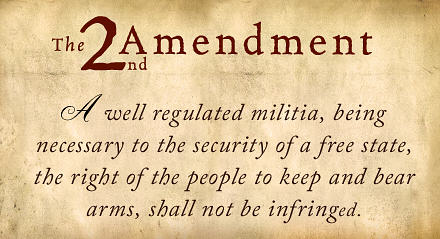
By Eric King, Guest Contributor.
This article was first presented on JPFO eight years ago — demonstrating many pertinent observations and truths. The truths then are just as relevant now, if not more so, and make it seem well worthwhile to present the piece once again.
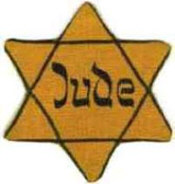 Not just for years but for decades I have been perplexed by the fact that American Jews are overwhelmingly anti-gun. Now they are not just indifferent to guns as they were when I was growing up 60 years ago, but today they are genuinely hostile to them. They are both in leadership positions of the movement to ban private ownership of all firearms as well as at the grass-roots level individually in favor of gun bans by over 10 to 1. After much thought I have arrived at what appears to be the explanation for this cultural aversion to firearms by most American Jews, and since I have never seen anything like this explanation in print anywhere, I thought it worth writing the following essay describing what for want of a better term I refer to as "the shtetl mentality."
Not just for years but for decades I have been perplexed by the fact that American Jews are overwhelmingly anti-gun. Now they are not just indifferent to guns as they were when I was growing up 60 years ago, but today they are genuinely hostile to them. They are both in leadership positions of the movement to ban private ownership of all firearms as well as at the grass-roots level individually in favor of gun bans by over 10 to 1. After much thought I have arrived at what appears to be the explanation for this cultural aversion to firearms by most American Jews, and since I have never seen anything like this explanation in print anywhere, I thought it worth writing the following essay describing what for want of a better term I refer to as "the shtetl mentality."
I was raised in New York City and later in a New Jersey suburb of New York by Jewish parents who had no interest in firearms, nor did any members of my extended family. Like most boys in those pre-PC days I had toy guns, but BB guns were absolutely forbidden. When I asked for one when I was 8, I was not told, "You're too young" or "Maybe when you're older." I was told, "Not in my house." As far as I knew, I was the only Jewish boy who asked for one.
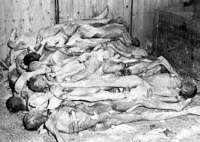 My interest in "real" guns stems from a specific event. I was six years old sitting in my grandparents living room looking through old Life magazines. I came upon the photographs taken at the liberation of the death camps. I saw the pictures of bodies stacked like cord wood. I was stunned. "Mommy, why are all those people dead?" I asked.
My interest in "real" guns stems from a specific event. I was six years old sitting in my grandparents living room looking through old Life magazines. I came upon the photographs taken at the liberation of the death camps. I saw the pictures of bodies stacked like cord wood. I was stunned. "Mommy, why are all those people dead?" I asked.
- My mother, a brilliant and subtle woman, thought for a moment and said, "The bad Germans called Nazis killed them." Remarkably even in 1947 she made the distinction between the group "Germans" and the subgroup "Nazis."
- Of course, I asked, "Why did the Nazis kill them?"
- She replied, "They killed them because they were Jews."
- Although I was only six and not yet sure of my identity or its meaning, I asked, "We're Jews, aren't we?"
- "Yes," answered my mother.
- Almost without missing a beat I asked, "Mommy, do you and Daddy have a gun so we can protect ourselves if the Nazis come for us?"
- My mother sought to reassure me of my security by answering, "This is America. That can't happen here."
All across America little Jewish boys and girls got the same answer and accepted it, but that answer never satisfied me. From that day on I wanted to own a gun and know how to shoot it. The question is where did that answer come from and why, in the face of no little anti-Semitism in America, did Jews in 1947 and thereafter so strongly devote themselves to the answer that it could not happen here. For example, in a New Jersey suburb of New York City with a large Jewish population in 1955 why was I the only Jewish member of the junior high school rifle club? There even were two girls and two Blacks, along with about 35 Caucasian boys of various Gentile parentage, but I was the only Jew. I tried repeatedly throughout junior high and high school to interest Jewish friends in visiting the rifle club. None would step outside the accepted Jewish sphere of organizations like chess and math clubs and the debate team.
My parents were moderately supportive of this interest because they saw substantial positive effects of my target shooting in that I became much more disciplined and focused where previously I had been opposed to authority figures. I quickly recognized that you could not have 40 12 to 14 year old boys shooting guns without someone in charge to make the rules absolutely clear and then to enforce them. This was a role admirably filled by a local police lieutenant who worked very well with adolescents and probably had more influence on me than anyone outside my own family, especially my understanding of why people living in groups could not demand absolute freedom to do anything they wanted. Nevertheless my parents were still skeptical of the long-term value of my interests in this area and wished I would be more like other Jewish boys. For example, they were never willing to pay for my ammunition which I had to buy with the earnings from my paper route.
At that time I encountered a few Holocaust survivors who told me that just as American Jews felt secure from genocide in 1956, German Jews had felt similarly secure in 1926. 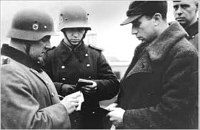 They said that if you had asked every Jew in Berlin in 1926, "Do you think it is possible that 20 years from now almost every Jew in Europe will be dead, systematically exterminated by the German government?" almost all would have thought you were crazy. Needless to say, these Jews were more skeptical of their security in America, but it is important to note that I did not then, do not now and never in the intervening years have felt that there was some imminent likelihood of genocide against Jews, or for that matter any other group, in America. I just never saw the wisdom of assuming 50 or even 20 years from now this could not change.
They said that if you had asked every Jew in Berlin in 1926, "Do you think it is possible that 20 years from now almost every Jew in Europe will be dead, systematically exterminated by the German government?" almost all would have thought you were crazy. Needless to say, these Jews were more skeptical of their security in America, but it is important to note that I did not then, do not now and never in the intervening years have felt that there was some imminent likelihood of genocide against Jews, or for that matter any other group, in America. I just never saw the wisdom of assuming 50 or even 20 years from now this could not change.
This brings us to the shtetl mentality. Before the existence of the state of Israel ever since the diaspora Jews have lived in small areas of other people's countries. Among American Jews this now typically means great grandparents who lived in shtetls or ghettos, segregated, isolated rural or urban areas in Europe. One of the major hazards of this situation was that occasionally a few Cossacks would get drunk, ride over to the nearest shtetl, rape a few women, maybe murder a man who protested rather than begging for his life and then ride off into the sunset, big fun... for the Cossacks.
It had to be inescapably clear to these Jews that there were dozens if not hundreds of them, able-bodied and sober, surely a match for 8 or 10 drunk Cossacks. It would have been easy, even for people not trained in arms, to kill them and bury them someplace, but it is obvious why they did not. If they had done so, all the Cossacks would have come to the shtetl fully armed for battle. They would have massacred every Jew in this shtetl and every other one within 100 versts. Defense was just not an option, not a survival trait. The women raped and the men murdered had to be seen as the price Jews paid for living, for surviving as a people. Since no Jew ever even remotely considered the possibility that without some major provocation someday the Cossacks would try to kill them all, it seemed like a reasonable if awful compromise.
Such a compromise must have taken a devastating and horrific psychological toll on the people forced to make it. Sooner or later someone among our traumatized ancestors had to make the following rationalization to justify this situation: "We are better than those people because they are violent and we are not. They handle weapons, and we do not." In order to maintain self-respect people in such a condition had to explain it as the result of something that made them better than their oppressors. This was the notion that they voluntarily (rather than of necessity as was the actual case) eschewed the use of weapons of any sort because they understood that violence was evil while their tormentors did not. It was the key to survival, self-respect and eventually the shtetl mentality which American Jews, far removed from the shtetl, still carry with them despite the fact that it has long since lost its utility.
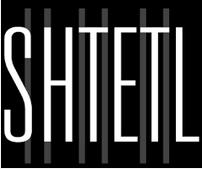 There is now no possibility that if a 21st century American Jew used a weapon to defend him or herself, even to the point of lethality, against an assailant, anti-Semitic or not, that all the anti-Semites would descend on South Florida to murder all the retired old Jews who live there. What is worse, the shtetl mentality lumps all violence together in its rationalized prohibition of the use of weapons. For those with the shtetl mentality the knife wielding rapist who would slash a women's throat after assaulting her is no different from the gun wielding woman who would shoot such a man to defend herself and her 12-year-old daughter.
There is now no possibility that if a 21st century American Jew used a weapon to defend him or herself, even to the point of lethality, against an assailant, anti-Semitic or not, that all the anti-Semites would descend on South Florida to murder all the retired old Jews who live there. What is worse, the shtetl mentality lumps all violence together in its rationalized prohibition of the use of weapons. For those with the shtetl mentality the knife wielding rapist who would slash a women's throat after assaulting her is no different from the gun wielding woman who would shoot such a man to defend herself and her 12-year-old daughter.
Why is the shtetl mentality limited to American Jews? Do not Israeli Jews come from the same ghettos and shtetls? Yes and no. American Jews are the direct descendants of immigrants who left the ghettos and shtetls with the shtetl mentality intact and came to the United States between 1885 and 1925. They raised their children who raised their children to believe all weapons were wrong because all violence was wrong even though the conditions in America were different, the horrible compromise of Europe was behind them, and their survival and self-respect no longer depended on willingness to let some members of the group be raped and murdered without defending themselves.
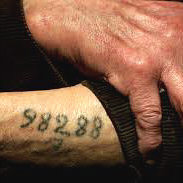 The Jews who remained in Europe lived through the Holocaust. This caused the ones who survived and emigrated to Israel to see that the rules had changed. They saw that not all violence was wrong, that violence could be used to preserve the Jewish people and that the defensive use of weapons was necessary for the survival of the group. This led to a greater acceptance of individual use of weapons for personal defense. American Jews only observed this from afar. They did not live it so they did not adopt this new insight as valid for themselves even if most grudgingly accepted it as necessary for Israeli Jews.
The Jews who remained in Europe lived through the Holocaust. This caused the ones who survived and emigrated to Israel to see that the rules had changed. They saw that not all violence was wrong, that violence could be used to preserve the Jewish people and that the defensive use of weapons was necessary for the survival of the group. This led to a greater acceptance of individual use of weapons for personal defense. American Jews only observed this from afar. They did not live it so they did not adopt this new insight as valid for themselves even if most grudgingly accepted it as necessary for Israeli Jews.
The shtetl mentality has led to the Jewish Plan A for what to do in case seriously bad things begin to happen to Jews in America. Under such circumstances Jewish leaders plan to yell "Holocaust" as loudly as they can. They plan to use their not insubstantial resources and assets in the media to do this in hopes that the rest of Americans will rise and protect them from whatever new Cossacks have emerged. While this is a most reasonable Plan A, the fact that if this fails there is no Plan B is at the heart of what is foolish and stupid about the shtetl mentality. We have learned, or we should have learned, that there always must be a Plan B, a Plan B based on the notion that for a Jew the phrase "assault rifle" is a misnomer. The correct term, once the shtetl mentality has been transcended, is "Jewish defense rifle."
In a way it is both ironic and sad that one of the best insights I ever have gotten into the relation of the Jewish portion of my identity to the rest of the world comes from a most unlikely source, the late Eldridge Cleaver, he of Black Panther Party fame. Once I heard him say, "The Jews are God's chosen people. When anyone wants to blame something on someone, they choose the Jews." Anyone of us who refuses to recognize this potentially is doomed.
Sincerely, Eric King
NOTE - the original received 29 comments and these can be referenced by going to that page and scrolling down to read them.
![]()

























